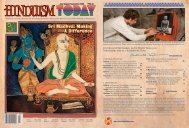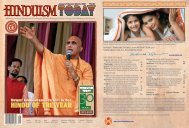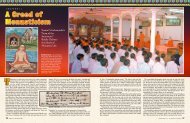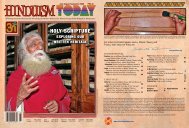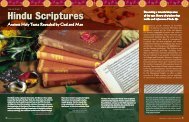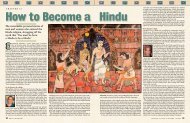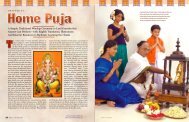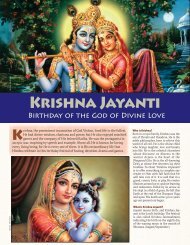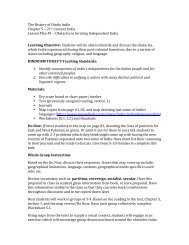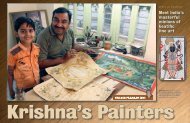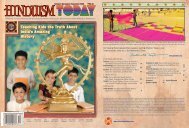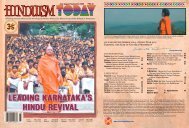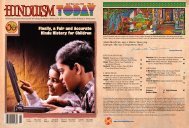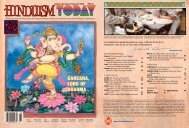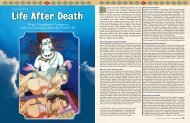Hinduism Today July 2007 - Cover, Index, Gatefold, Front Articles
Hinduism Today July 2007 - Cover, Index, Gatefold, Front Articles
Hinduism Today July 2007 - Cover, Index, Gatefold, Front Articles
Create successful ePaper yourself
Turn your PDF publications into a flip-book with our unique Google optimized e-Paper software.
amdas lamb<br />
Bilaspur friends: Ramya, in yellow blouse, with the Bhatpare clan and friends—pen-pal Kishore is in purple, left of her father, Gajanan<br />
y o u t h<br />
My Encounter with Caste<br />
An American-born brahmin girl, 17, meets her “untouchable” pen pal<br />
By Ramya Gopal, Troy, Michigan<br />
y head bobbed on my mother’s<br />
shoulder as our car rattled down<br />
the street. The pavement steadily<br />
worsened the farther away we<br />
drove from Bilaspur, in Chattisgurh State<br />
in middle India. Our only competing traffic<br />
were herds of cows. Two previous days<br />
of riding in a train and very few hours of<br />
sleep had worn me out. We were heading<br />
to a small village called Mathiya to visit a<br />
family who belonged to the group of people<br />
once called the “untouchable” caste. Since<br />
being born into a brahmin family has little<br />
significance in America, I was brought up<br />
blind to the idea that caste had any modern<br />
relevance. Although this helped broaden my<br />
perspectives in some ways (I never assumed<br />
that I could have greater privileges because<br />
of my caste), it also made the idea of caste<br />
discrimination incomprehensible to me. My<br />
mother sought to dispel my naiveté by taking<br />
me to the heart of a country that sometimes<br />
still follows regressive discriminatory<br />
practices based on caste. What began as a<br />
written correspondence between me and a<br />
girl of the “untouchable” caste escalated until<br />
a damp <strong>July</strong> morning when I found myself<br />
at the train platform in Bilaspur, waiting<br />
for a car to arrive.<br />
Although the sun had brightened considerably<br />
since four in the morning when we<br />
departed the station, the skies were still<br />
partially overcast with monsoon clouds. I<br />
felt like I had lost my bearings when our<br />
car eventually stopped in front of a house.<br />
Bhagwati Uncle led the procession by entering<br />
through the doorway where several<br />
people were standing just beyond. The only<br />
light came from the open courtyard. I sat<br />
apprehensively on the bed, blinking at these<br />
unfamiliar faces who were smiling kindly at<br />
ramdas lamb<br />
Pen pals: Ramya Gopal and Kishori met for the first<br />
time in Bilasur after corresponding for two years<br />
me. They were shortly introduced as my<br />
friend’s grandfather, her father and their<br />
neighbor. A homely woman rushed out from<br />
a room and hugged me tightly as if I was<br />
her favorite niece. “Kishori will be here in<br />
a minute,” she said in Hindi, translated by<br />
my mother, and went back into the room. I<br />
fidgeted with my glasses and managed a selfconscious<br />
smile.<br />
Kishori, age 19, and I had been pen pals<br />
for almost two years, but had never met.<br />
We were introduced by Dr. Ramdas Lamb,<br />
professor of religion at the University of Hawaii.<br />
He’s an advisor to my mother’s Hindu<br />
reform organization, Navya Shastra, and<br />
has been associated with Kishori’s village<br />
for many years. She would write letters in<br />
Hindi, which my mother would translate<br />
for me; I would write back in English, and<br />
someone would translate for her. We wrote<br />
about our personal lives and day-to-day happenings,<br />
exchanging our thoughts on cultural<br />
novelties. Her letters were always very<br />
sweet. Within a few months we became<br />
close friends, and I began to call her “my<br />
sister.” Although she continually invited me<br />
to visit her in Chattisgarh, time had not permitted<br />
me to accept her invitation until now.<br />
“Kishori! Kishori!” her mother called several<br />
times. A few minutes passed, then a<br />
young woman briskly walked out with her<br />
head bowed shyly and came to sit on the cot<br />
beside me. There was an awkward silence,<br />
followed by a melee medley of Hindi and<br />
English, and then silence again. “Kishori, I<br />
am so happy to see you,” I started in English.<br />
She smiled and nodded. I said, “How are<br />
you? How do you like school?” I asked many<br />
questions, not knowing where to begin.<br />
Kishori explained—in Hindi, again translated<br />
into English by my mother—that she<br />
was in the second year of college, but she<br />
had spent most of the first year of college<br />
at home. “I learned better studying at home.<br />
The teachers hardly taught us anything,” she<br />
said. I learned that her favorite subject was<br />
geography, that she was an English major<br />
who had read the works of Keats and Tennyson<br />
and studied in a government college<br />
predominantly for the Scheduled Castes.<br />
Scheduled Caste (pronounced as “sheduled”)<br />
was a term resulting from the British<br />
government in The Government Act of<br />
1935. It formally abolished untouchability<br />
and reclassified the lower-castes in lists, or<br />
schedules, hence Scheduled Castes. Gandhiji<br />
introduced the word Harijans (children of<br />
God) to describe them, believing that the<br />
connotation of the word was more uplifting<br />
than merely “Scheduled Caste;” but this<br />
“As friends, the upper castes treat me<br />
fine. When we are together in a religious<br />
space, we see their true colors.”<br />
—Kishori<br />
term did not receive the welcome<br />
he had expected. “Gandhiji separated<br />
us when he called us Harijans,”<br />
explained neighbor Mohan<br />
Ram. Kishori’s father and her<br />
grandfather nodded in agreement.<br />
Another grouping, ranked<br />
slightly higher by the British, was<br />
called “Other Backward Castes,”<br />
or OBCs. Although both were<br />
derided equally by the still higher<br />
castes, the OBCs were determined<br />
to maintain their traditional social<br />
superiority over the SCs, based<br />
solely on their higher ranking in<br />
the 1935 act, Dadaji explained. He<br />
mused, “OBCs eat meat and drink<br />
alcohol, while we are pure vegetarians,<br />
but are still considered lower.”<br />
Dadaji is a friendly, bespectacled grandfather<br />
who speaks patiently, as if he has<br />
come to terms with his life. “In my time,”<br />
he began, “there was much discrimination.<br />
I stayed in a hostel in college. We SCs were<br />
forced to sleep and eat separately from all<br />
the other castes. Even when we were working,<br />
we would sit separately from them because<br />
we had grown to be scared of them.<br />
The officers would look at me as if I were<br />
beneath them. Even today, all the houses in<br />
each area of the village are for people belonging<br />
to the same caste.” He pointed to the<br />
fork in the road that separated the houses of<br />
the SCs from the houses of the OBCs.<br />
Kishori’s father, Professor Gajanan Bhatpare,<br />
explained that Kishori wasn’t always<br />
spared the whiplash of discrimination. “She<br />
usually receives very good grades. But her<br />
schoolmates sometimes become jealous that<br />
she is from a lower caste, yet she gets higher<br />
scores than they do. The upper caste students<br />
taunt her behind her back, but they<br />
keep their jealousy inside more, because<br />
we are a respectable, educated family. The<br />
upper castes pick more on other families.”<br />
Kishori’s father is a professor of political<br />
science at her college; his brother, Bhagwati<br />
Uncle, is a geography teacher at a high<br />
school.<br />
Professor Lamb arrived midway through<br />
the conversation, having come from Hawaii<br />
to Bilaspur to teach as a visiting professor.<br />
In this way he has been helping this<br />
village for the last thirty years. “Gajanan,”<br />
he started, “is the ideal teacher. Everyone<br />
looks up to him and his family, and all the<br />
students come to his house. The families<br />
trust Bhatpare Sir.” “Yet,” he continued,<br />
“the families won’t eat with them or perform<br />
religious ceremonies with them. I’ve<br />
even seen them put up a string which they<br />
cannot cross. They know better, and on an<br />
individual level, they won’t feel discrimination,<br />
but at a social level, they will.” Kishori<br />
spoke up to reinforce this point: “As friends,<br />
the upper castes treat me fine. When we are<br />
together in a religious space, we see their<br />
true colors.”<br />
Bhagwati Uncle’s two sons entered the<br />
room, bowing to their relatives and my father<br />
with a polite smile and touching the<br />
feet of my mother, Kishori and me. I looked<br />
inquisitively about for someone to explain<br />
what was going on. “We touch the feet of<br />
the niece and nephew as respect for Kauslya<br />
and Ram,” Monu helpfully clarified with<br />
a smile. “All castes except brahmins do this,<br />
but especially us since we are Satnamis.”<br />
Satnami is a sect of <strong>Hinduism</strong>, found mostly<br />
in the scheduled caste areas of Chattisgarh,<br />
which was founded by the Ram bhaktar,<br />
Guru Ghasidas (en.wikipedia.org/wiki/<br />
Guru_Ghasidas). “Ramya didi (sister), deep<br />
down I wonder why I should be considered<br />
lower than others. It’s not something I’m<br />
happy with,” he said with a pained expression.<br />
“But I’m happy to be a Satnami.”<br />
Sonu agreed with his brother’s sentiments.<br />
“Indirectly, discrimination happens.<br />
The minute they find out that we might be<br />
reservation students, their attitude changes<br />
completely. When someone asks me if I am<br />
an untouchable, I feel very sad. Papa feels<br />
sad, too.”<br />
“We try to do things for our people, but it’s<br />
not enough,” Bhagwati Uncle told us sadly.<br />
“It really hurts. Sometimes, we just want to<br />
run away from here.” Professor Ramdas<br />
Lamb commented with a worn expression,<br />
“This isn’t going to change for another few<br />
generations.”<br />
These words, their story, was my introduction<br />
to a turbulent world that had never<br />
converged with mine before. I was dumbfounded.<br />
Caste discrimination is an idea<br />
that seems simplistically backwards, but<br />
the people of Mathiya, a microcosm of the<br />
larger SC communities, gave it reality and<br />
immediacy through the telling of their painful<br />
stories. Although I realized that I could<br />
never completely understand the trauma of<br />
their experiences and the bleak despair of<br />
the future, this encounter took me one step<br />
forward.<br />
∏π<br />
ramya gopal, 17, is a freshman at<br />
swarthmore college in pennsylvania.<br />
60 hinduism today j u ly / au g u s t / s e p t e m b e r , 2 0 0 7 j u ly / au g u s t / s e p t e m b e r , 2 0 0 7 h i n d u i s m t o d ay 61



